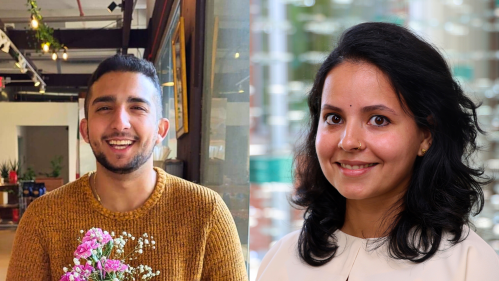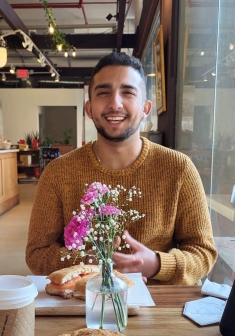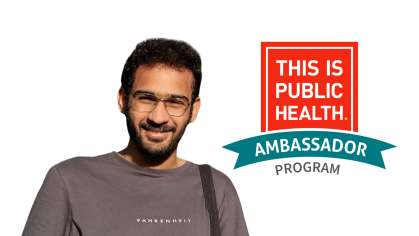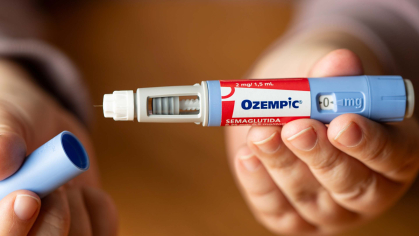NHEW 2024: Rutgers School of Public Health Students Reflect on Mental Wellness in Public Health Education and Practice

October 21 through October 25 is the Society for Public Health Education’s (SOPHE’s) National Health Education Week (NHEW). Since 1995, SOPHE has led this annual observance to increase awareness of timely public health issues and promote a better understanding of the role of health education and promotion. Rutgers School of Public Health is contributing to this vital endeavor by sharing the experiences and expertise of our community members.

For NHEW’s theme, Nurturing Mental Wellness for a Healthier Tomorrow, we sat down with Rutgers School of Public Health students for a Q&A featuring Abanoub Armanious, a Master of Science (MS) in Epidemiology student concentrating in Pharmacoepidemiology, and FNU Neha, a Master of Public Health (MPH) student concentrating in Population Mental Health.
Abanoub and Neha offer their unique perspectives, personal experiences, and insights into how mental health impacts future public health leaders’ education and overall well-being.
What first sparked your interest in mental wellness and its connection to public health?
Abanoub: Two weeks before graduating with a joint B.Sc. in Public Health, I was diagnosed with Major Depressive Disorder. The root of the long-standing challenges I faced since childhood became clear after growing up in a conservative environment where mental health was not acknowledged.
While I had learned to manage my diagnosis independently, the isolation of the COVID-19 pandemic led me to seek help through the university’s mental health services. I was fortunate to access these resources, but the struggle to find care for much of my life shaped my understanding of the barriers many face. This personal battle ultimately fueled my passion for public health, where ensuring equitable access to mental health care is critical.
Neha: During my undergrad in India, when I was doing a one-year internship as part of my Ayurveda degree, Indian traditional medicine, I treated patients of all ages. I made it a point to talk with them, not just about their physical issues, but also to understand how they were feeling overall.
What really stood out to me was that almost everyone who was dealing with physical illness also seemed to be struggling mentally. However, even when I asked them directly, many hesitated or avoided talking about their mental health. It got me wondering why there is such a stigma around discussing mental well-being. That curiosity ultimately led me to pursue my MPH in population mental health.
How do you think mental wellness impacts overall health outcomes in the populations we serve? What role do you see mental wellness playing in the future of public health education and leadership?

A: I am a student assistant researcher working under Assistant Professor Morgan James in the Department of Psychiatry at Robert Wood Johnson Medical School. The James Lab investigates the neural basis of psychiatric illnesses, including cocaine use disorder and binge eating disorder, to inform the development of better treatments.
Eating disorders have been my focus for the past three and a half years, using behavioral assays to assess reward-seeking in rats. While animal models provide valuable insights into behavior, they cannot communicate their emotional or psychological states, underscoring how mental wellness influences overall health. Poor mental wellness is associated with an increase in the likelihood of risky behaviors, lower immune response, and the worsening of chronic disease outcomes, which is evident from thematic analyses our lab has begun to conduct on existing medications.
As public health education evolves, mental wellness must be integrated into training future leaders to create holistic care models that address both psychological and physical health.
N: Mental wellness is a crucial factor in overall quality of life. For example, individuals with mental health challenges often struggle with managing other areas of life, such as adhering to treatment plans or even handling daily tasks, which can ultimately lead to a decline in their physical health.
I firmly believe that mental wellness will be a cornerstone of future public health education and leadership. The increasing recognition of mental health's parity with physical health is a promising trend. As the stigma around mental health diminishes, I foresee mental wellness becoming an integral part of every health intervention and policy decision. This holistic approach, addressing both physical and mental health, will be the future of public health.
What strategies do you personally use to maintain your mental wellness, especially while balancing personal, academic, and professional responsibilities?
A: My mind, as others have described theirs, sometimes feels like an overloaded internet browser—multiple tabs open, some frozen, and I have no idea where Troye Sivan's whole discography is playing from.
While I despise boredom, I have learned that it is more fulfilling to close tabs than to open new ones when I am stretched across multiple responsibilities. To clear my mental clutter, I write down anything and everything in my phone's notes app. Getting deadlines and personal tasks out of my head helps me declutter by prioritizing certain ones and allocating specific time blocks to address them on my Google calendar. When everything is in order, I can finally listen to Troye Sivan uninterrupted because a good music session or rewatching one of my favorite shows is a great way to de-stress.

N: Every day isn’t the same, and I’d be lying if I said I’ve mastered maintaining my mental wellness, but I make a consistent effort. I prioritize tasks by planning my day ahead of time, which helps me stay calm and prevents feeling overwhelmed.
For me, de-stressing comes through dancing, which also doubles as physical activity and mindful cooking—both of which are my forms of self-care and meditation. I also make it a point to take short breaks daily to recharge and focus on my personal life—for example, I like to step away and enjoy a cup of tea while reflecting or simply taking a moment to breathe.
Reflecting on my progress and focusing on the positive aspects of my life keeps me motivated. Staying connected with my family, my cats (I video call them daily), and friends is crucial; even a short chat with them lifts my mood and makes me feel better.
How can public health professionals model best practices for mental wellness? What advice would you give to fellow students or professionals struggling to prioritize their mental wellness?
A: "We do not know what we do not know"—a simple Copernican idea that often slips through the cracks among public health professionals deeply entrenched in their expertise. Rather than making assumptions based on generalized experiences, they can challenge the stigma that surrounds mental health by actively listening to individuals and recognizing the unique challenges they face.
Fostering understanding is most effective, though, when individuals simultaneously advocate for their mental wellness, even when it feels uncomfortable because the discomfort of unmet needs is often far greater. Public health professionals, particularly those in positions of authority, should not only address the needs of others in such moments but also ensure their mental well-being is prioritized. They cannot help others effectively until they are in a good place.
Ultimately, creating an environment where mental wellness is openly discussed and supported benefits everyone, creating a culture of compassion and accountability built upon mutual respect.
N: I encourage every public health professional to emphasize the importance of mental health and well-being by openly sharing their own struggles and coping strategies as examples. It is crucial to help others realize that talking about mental health and seeking help when needed is not only okay but necessary. There is nothing wrong with reaching out for support.
By highlighting the importance of caring for our own mental health and practicing self-care, we can be better equipped to care for those we love. The message is simple: it starts with us, and the right time is now.
My advice to fellow students or professionals struggling to prioritize their mental wellness is to start small and take it one step at a time. Do not stress over not having it all figured out—that can only add to the problem. Begin with simple practices, like taking short breaks, setting aside time for hobbies, or connecting with nature, family, and friends.
Mental wellness should not be seen as a luxury; it should be a fundamental part of our daily lives, much like brushing our teeth. The goal is to make it a natural part of your routine. Recognizing that you deserve to take care of your mental health is the first and most important step.


